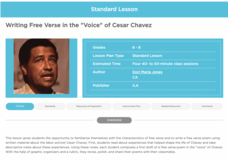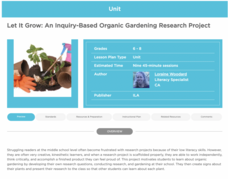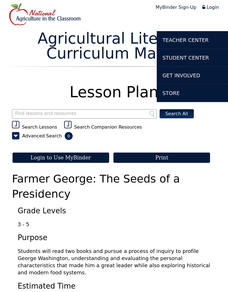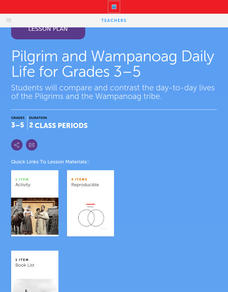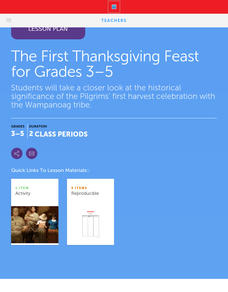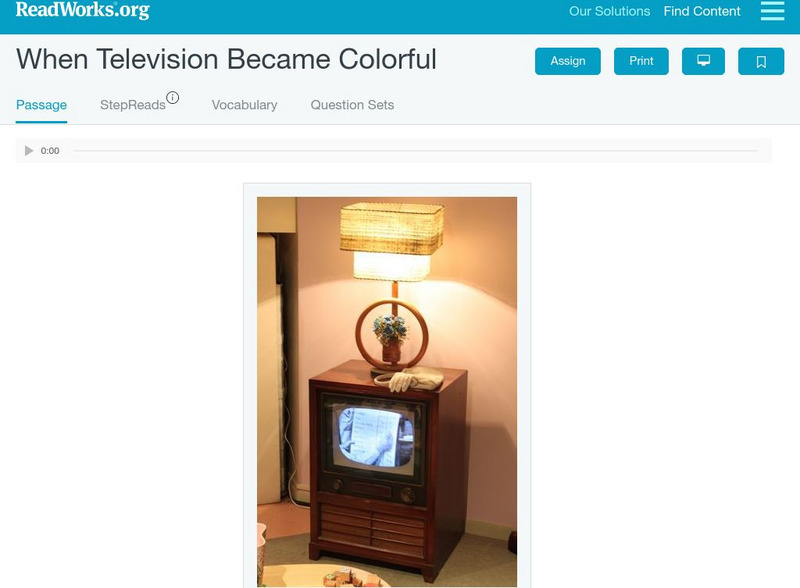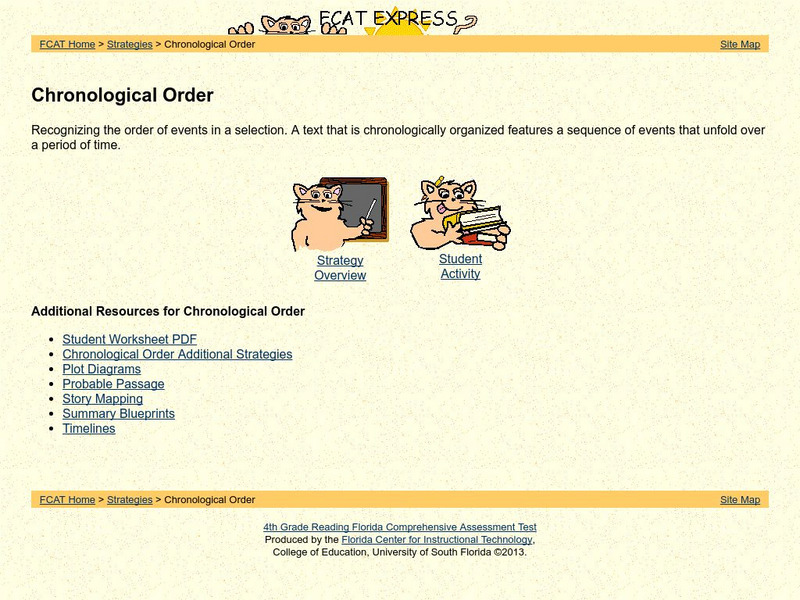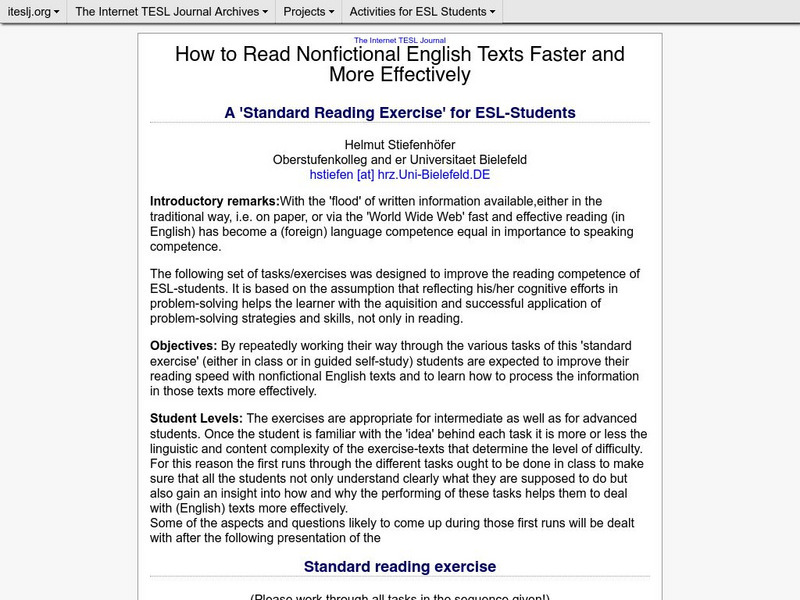Learning for Justice
Looking Closely at Ourselves
A thoughtful discussion about self-reflecting leads to a conversation about skin color and making a list of words associated with "beauty." Budding artists use a mirror to examine their features and create a self-portrait. Peers critique...
ReadWriteThink
Robert Frost Prompts the Poet in You
A great poem begins with an idea, an image, or an event that evokes a feeling. Middle schoolers read biographical information about Robert Frost and then identify details in three of his poems that reflect his life. Using suggestions...
ReadWriteThink
Writing Free Verse in the "Voice" of Cesar Chavez
Introduce middle schoolers to free verse poetry with a instructional activity that has young poets read two free verse poems and list the common characteristics of the form. They then read a passage from Cesar Chavez's biography and a...
ReadWriteThink
Persuasive Essay: Environmental Issues
Young environmentalists learn how to craft a persuasive essay about an environmental issue they consider important. After studying the components of a persuasive essay and examining a student model, writers brainstorm possible topics and...
ReadWriteThink
Let It Grow: An Inquiry-Based Organic Gardening Research Project
How does your garden grow? An inquiry-based, organic gardening unit asks young scientists to research a vegetable or flower, create an environment for it, and then plant and tend to the seedling. Gardeners develop their own research...
Agriculture in the Classroom
Farmer George: The Seeds of a Presidency
Three activities make up a lesson that explores the connection between former president George Washington, the farming industry, and leadership. Scholars listen to two read aloud, Farmer George Plants a Nation by Peggy Thomas and...
Scholastic
Voyage on the Mayflower for Grades 3-5
Following an online activity, scholars complete a Grafitti Wall in which small groups write words and phrases on chart paper pertaining to Pilgrims, the Mayflower, and Thanksgiving. Pupils perform a close reading then answer a series of...
Scholastic
Pilgrim and Wampanoag Daily Life for Grades 3-5
Thirteen steps make up a lesson plan that challenges pupils to compare and contrast the daily lives of Pilgrims and the Wampanoag tribe. Learners revisit the Graffiti Wall then break into small groups for an investigative reading...
Scholastic
The First Thanksgiving Feast for Grades 3-5
Scholars examine the first Thanksgiving through books and interviews while they complete a KWL chart. Pretending they are part of the feast, learners craft a scrapbook page that features images related to their experience. Pupils reflect...
Scholastic
Voyage on the Mayflower for Grades 6–8
Imagine living in the hold of a sailing ship for 63 days, enduring rough seas and autumn storms. As part of a study of the voyage of the Mayflower, class members examine an online resource that details life about the ship, watch a slide...
Teaching Tolerance
Digital Activism Remixed: Hashtags for Voice, Visibility and Visions of Social Justice
It's time to discover hashtag activism! Using an engaging resource, learners explore viral hashtag campaigns relating to diversity, identity, and justice. Next, they either design their own hashtag campaigns or respond to existing ones.
Teaching Tolerance
Civic Engagement and Communication as Digital Community Members
Don't feed the Internet trolls! Using a thought-provoking resource, pupils brainstorm a whole-class list of the possible kinds of bias young people may experience online. Next, in small groups, scholars create posters illustrating how to...
Teaching Tolerance
Media Consumers and Creators, What Are Your Rights and Responsibilities?
Teach the class to separate fact from fiction. Scholars explore the topic of fake news as they read PEN America's News Consumers' Bill of Rights and discuss the rights and responsibilities outlined in the bill. Next, they read an article...
PBS
Pbs Learning Media: Time Management
In this video segment from TV411, Ruby and her mom plan a schedule so she can complete her homework and still have time for friends and sports.
Other
Best Evidence Encyclopedia: Middle and High School Reading
Looking for opportunities to improve your readers or to help your readers get ahead? BEE presents a number of programs that have been evaluated by their researchers to bring educators the best programs on the market. Learn about programs...
Read Works
Read Works: Passages: Grade 2: When Television Became Colorful
[Free Registration/Login Required] Students read a non-fiction article about colored television and answer questions in comprehension, sequencing, inferences, main idea, transitions, and more.
Daily Teaching Tools
Daily Teaching Tools: Additional Webs
This Daily Teaching Tools resource provides a series of graphic organizers. Students will be able to plan the writing of summaries, paragraphs, and literary responses.
University of South Florida
Fcat Express: Chronological Order
The site provides extensive assistance in preparing 4th-grade students for Florida Comprehensive Assessment Test. This section focuses on identifying the chronological order.
Utah Education Network
Uen: Enlightening Explorations
This lesson engages students in making observations about different features of light. Students will circulate in different light stations, reflect on what they have observed, and then write about what they learned.
PBS
Pbs Learning Media: Write Now! Career Writing Prompts: Director, Human Resources
WLVT PBS 39 and PSEA have teamed to create these innovative writing prompts on careers. This 1-minute video provides an opportunity for students to learn a bit about a career as a Director of Human Resources, and to write feedback to the...
Teachers.net
Teachers.net: The Gingerbread Man
Introduce your primary learners to retelling and sequencing skills. Will also help move your students to higher-level thinking which deals with characters, setting, and plot. Site offers one week's worth of lessons.
TESL Journal
The Internet Tesl Journal: Reading Nonfiction Texts Fast
Article lists a series of steps and tasks to make reading texts more efficient and clear. Written primarily for teachers of ESL students but tasks work for all students.
AdLit
Ad lit.org: Literacy Practices Interview
Literacy practices interviews are informal assessments that elicit information on students' reading and writing activities, including their free-time reading habits, their access to books, and their attitudes toward reading and writing....
AdLit
Ad lit.org: What Should an Assessment System Look Like?
The developmental nature of reading means that diagnosing the reading comprehension ability of adolescents is more challenging than diagnosing reading comprehension among third graders. In particular, assessments should not only capture...




